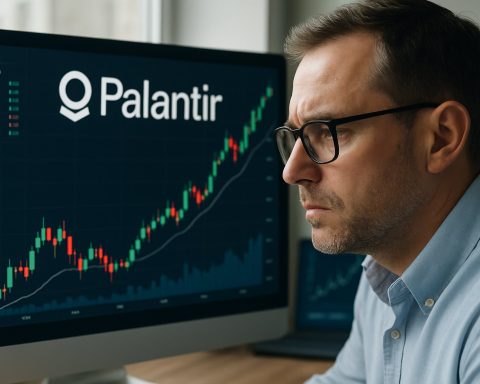- Elon Musk’s Department of Government Efficiency (DOGE) seeks to revolutionize the IRS via a hackathon, aiming to integrate old systems with a futuristic “mega API.”
- The initiative involves Sam Corcos and Gavin Kliger, who pause $1.5 billion in IRS modernization projects to focus on seamless data access.
- Concerns arise about fiscal privacy and data security amidst potential partnerships with companies like Palantir, known for advanced data platforms.
- Internal restructuring at the IRS raises questions about the feasibility of rapid technological change without risking essential operations.
- Debate centers on balancing innovation with privacy, as critics express concerns over the handling of sensitive taxpayer information.
- Musk’s vision poses an existential question: Can technology advancements coexist with stringent data privacy requirements?
A tempest brews in the heart of Washington, where Elon Musk’s audacious Department of Government Efficiency (DOGE) aims to shake the very foundations of the IRS. The initiative centers on a bold hackathon, promising to bridge ancient systems with a futuristic “mega API,” a seamless interface that could reshape government data access. Yet, in this grand vision lies a tale as thrilling as it is intricate—a story that could redefine, or unravel, fiscal privacy.
At the helm of this digital crusade stand Sam Corcos and Gavin Kliger, two mavericks with diverse pedigrees. Corcos, famed for his health-tech ventures linked to Musk’s SpaceX, casts his innovative eye on the IRS. Kliger, fresh from UC Berkeley and AI-laden roles, steps up as the pulse of this operation. Together, they orchestrate a strategy to pause existing modernization efforts, slashing $1.5 billion from IRS projects, to forge a singular path toward a data-driven future.
But why does this hackathon matter? Picture this: a world where IRS data flows like a digital river, accessible through a single API, akin to a key unlocking a vault of bound data. This radical approach aspires to eliminate cumbersome silos, granting eventually seamless data access across platforms. Yet, therein lies the conundrum—what of security, the tight-lipped guardian of taxpayer confidentiality?
Palantir, the formidable software titan co-founded by Peter Thiel, looms as a potential partner. Eyes gleam with anticipation at the prospects of employing Palantir’s advanced platforms, backed by the revered FedRAMP approval. This endorsement opens doors—perhaps too widely, some skeptics whisper. The crux of the debate lies in balancing innovation with the sanctity of private data. Could such consolidation tip the scales toward vulnerability, exposing personal data with a sweeping broad stroke?
Within the IRS, murmurs grow louder as DOGE orders a dramatic reshuffle, sidelining top technologists in brazen cuts and placing the organization’s technological heart in the hands of a trimmed ensemble. This upheaval, driven by the urgency of the hackathon, tightens timelines from a year to weeks, raising eyebrows and fears alike. Can such sweeping changes be executed without jeopardizing crucial financial operations, such as the upcoming tax season?
Critics voice their concerns, pointing out the intricacies involved in orchestrating such a formidable data migration. Migrating archaic systems to a modern cloud infrastructure is no mean feat, requiring skilled navigators to steer this ship safely into new waters. The ambition to replace the IRS’s legacy, segmented systems with an all-seeing, all-encompassing cloud platform is palpable, yet fraught with potential dangers.
Privacy advocates raise the alarm, painting a dystopian picture where sensitive financial data might dance unrestrictedly across new digital landscapes, potentially at the mercy of third-party entities. The fear of unchecked access to taxpayer information fuels a debate that echoes through the halls of governance, questioning the very foundation of digital security.
As DOGE forges ahead, fueled by Musk’s daring vision, the broader question looms: Can innovation and privacy coexist, or must one prevail over the other? In this high-stakes gamble, the fate of financial privacy might rest on the edges of code intertwining the antiquated with the avant-garde. Musk’s quest for a disruptor’s haven amid the IRS’s labyrinthine corridors might just herald a new era—or perhaps a cautionary tale of unchecked ambition. Amidst the unfolding saga, one can’t help but wonder—will this be a masterstroke or a misstep in the annals of innovation?
Musk’s Bold IRS Hackathon: Innovation Masterstroke or Privacy Misstep?
Introduction
In a seismic move within Washington, Elon Musk’s creation of the Department of Government Efficiency (DOGE) targets a transformation of the IRS with promises of unparalleled innovation. The inception of a hackathon centrally aiming to merge antiquated systems through a “mega API” stands as a symbol of this ambition. The outcome: a redefined digital tapestry of government data access. But nestled within this futuristic vision lurks an equally audacious challenge—balancing innovative strides against the backdrop of financial privacy and security.
Exploring the Initiative
Led by Sam Corcos and Gavin Kliger, figures renowned for their transformative tech ventures, this initiative strategically reassigns $1.5 billion by pausing existing IRS modernization, opting for a radical redesign toward a unified data framework instead.
Why the Hackathon Matters: Bridging Data Silos with APIs
1. The Vision: Imagine IRS data as a flowing digital river, easily navigable via a singular API. This digital renaissance intends to eradicate existing data silos, ultimately realizing seamless data access.
2. The Challenge: However, this proposed flexibility raises significant security concerns. Confidentiality of taxpayer info is the metaphorical tightrope, precariously walk by DOGE’s ambitious endeavor.
Palantir’s Potential Role
– Advanced Data Capabilities: Partnering with Palantir, with its FedRAMP authorization, offers unparalleled data platform support. Yet, it’s the potential for overly broad access that signals alarm bells for skeptics worried about governmental overreach.
– Balancing Act: Successful integration requires balancing technological advances with robust privacy protections—a feat easier imagined than achieved.
Internal IRS Restructuring and Ramifications
– Technological Reshuffle: DOGE’s reshuffle sidelines seasoned experts. Accelerating the timeline from a year to mere weeks raises stakes for technological and operational eligibility—is the IRS equipped to manage such seismic shifts?
Privacy Concerns and Security Challenges
1. Public Concerns: Privacy advocates envision a dystopic landscape where sensitive taxpayer data may be vulnerable, sparking intense debate on digital security foundations.
2. Real-World Risks: Transiting from segmented legacy systems to an envisioned cloud platform might introduce unexpected vulnerabilities.
Balancing Innovation with Privacy: Can They Coexist?
– The Debate: Striking a balance between innovation and privacy remains the core question. Liz O’Connor, a cybersecurity expert, asserts that “successful innovation necessitates a secure foundation that should not be overlooked in the race to modernization.”
– Security Protocols: Incorporating robust encryption, continuous monitoring, and implementing strict access controls are crucial steps to ensure data safety ([source](https://www.cisa.gov)).
Actionable Recommendations
1. Increase Transparency: Regularly update the public and stakeholders on progress and security protocols.
2. Engage Independent Reviews: Welcome audits from neutral experts to identify loopholes and mitigate risks.
3. Prioritize User Privacy: Establish clear, enforceable data privacy guidelines in alignment with contemporary standards.
Conclusion
As DOGE imbibes Musk’s audacious vision, only time will tell whether this initiative will be lauded as a landmark in digital governance or serve as a cautionary tale of unchecked ambition. Ensuring success requires not just technological prowess, but trust—a factor built on the dual pillars of security and transparency.
For more information about innovative technologies, visit Washington Post.








